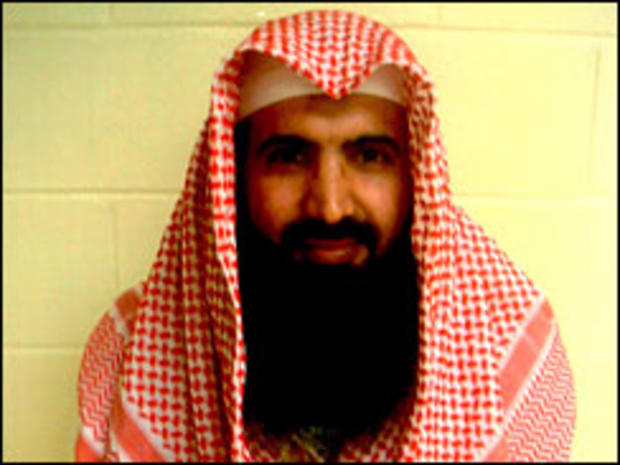Who is Ali al-Marri?
Ali Al-Marri is most notable for being one of three post-Sept. 11 alleged al Qaeda or Taliban operatives the Bush Administration yanked from the criminal justice system and subjected to indefinite military detention without charges as an "enemy combatant."
Like the most well-known of this infamous trio, Jose Padilla, al-Marri's legal saga began in the civilian criminal justice system, with the original criminal complaint accompanying his arrest in December 2001, the same day Zacarias Moussaoui was indicted for the Sept. 11 conspiracy. Al-Marri was later indicted by grand juries, first in New York and then in Peoria, Illinois in 2002.
Al-Marri, 44, from Qatar, had arrived in the U.S with his wife and five kids on September 10th, 2001, the day before the Sept. 11 terrorist attacks on America, and enrolled in a computer science graduate program at Bradley University, in Peoria, Illinois, where he had once earned an undergraduate degree.
Qatari Diplomat Was to Meet Jailed Terrorist
But authorities came to suspect he might be involved in a "second wave" of terror attacks. While arresting him and charging him with possession of stolen credit card numbers, the government alleged his computer contained files on U.S. chemical plants and lectures by Osama bin Laden.
Prosecutors called al-Marri an al Qaeda "sleeper agent" and alleged that a telephone calling card belonging to al-Marri was used repeatedly to call Mustafa al-Hawsawi, who had wired money to the Sept. 11 hijackers and is now one of the 14 "high value" detainees at Guantanamo.
In June 2003, right before al-Marri's schedule trial for the credit card fraud, President Bush withdrew the case and ordered al-Marri transferred to military custody. He spent the next five-and-half years in solitary confinement in the U.S. naval bring in Charleston, SC...the first year-and-half without access to a lawyer.
The Bush Administration justified the detention of Al-Marri, as well as Padilla (a U.S. citizen accused of plotting a nuclear "dirty bomb" attack), and earlier Yaser Hamdi (a dual Saudi-U.S. citizen captured in Afghanistan) with the Authorization to Use Military Force against the perpetrators of Sept. 11 and their associates that Congress passed one week after the attacks. This constitutional argument was litigated extensively - with Hamdi and Padilla's cases reaching the Supreme Court.
Last February, 2009, as the Supreme Court neared hear oral arguments about al-Marri's case, the Obama Administration reversed the executive branch's course - ending the policy of indefinite detention without charges of "enemy combatants" on U.S. soil, and transferred al-Marri back to the civilian system.
Last April, 2009, al-Marri pleaded guilty to providing material support for terrorism. He admitted to credit card fraud, plus:
- Training in al Qaeda military camps in Afghanistan between 1998-2001.
- Meeting chief Sept. 11 planner Khalid Sheikh Mohammed and agreeing to be deployed to the U.S. by Sept. 10, 2001 (the day he entered the country with his family).
-Meeting in Dubai, UAE, with Sept. 11 financier Mustafa al-Hawsawi and receiving $10,000 from him.
-Researching, while in America in the fall of 2001, the use of chemical weapons, where to get chemicals such as sulfuric acid and precursors for cyanide gas, and potential targets such as dams and tunnels.
-Establishing a fictitious business using a false name using stolen Social Security number (ostensibly to purchase the chemicals, which never occurred).
-Communicating in code with five different e-mail accounts, referring to himself as "Abdo" and to KSM as "Muk." (FBI investigators learned from their pre-CIA torturing interviews of Abu Zubaydah in 2002 that KSM was known to all as "Muktar," and that he/KSM/Muktar had been the primary planner of 9/11).
-Adopting the nomme de guerre "Abdul-Rahman al-Qatari" and providing al-Qaeda with his family contact information in case he was killed or "martyred" during an al-Qaeda mission.
Al-Marri's wife and five children now live in Saudi Arabia, as do a number of his siblings.
The key question at his October sentencing was whether al-Marri would receive credit for the seven years he'd spent in custody? Would time-served be deducted from the likely, maximum 15 year sentence? It was, thus his reported eight-year sentence. Al-Marri could be released from prison in 2017, when he is 50 or 51 years old.
Padilla, after being convicted in a multi-defendant jury trial in Miami (that did not include the "dirty bomb" allegations), was sentenced in January 2008 to 17 years for his conviction on conspiracy to provide material support to a terrorist group and also resides as the federal "Supermax" prison in Colorado. His projected release date, according to the Bureau of Prisons, is 2021, when he'll be 50.
